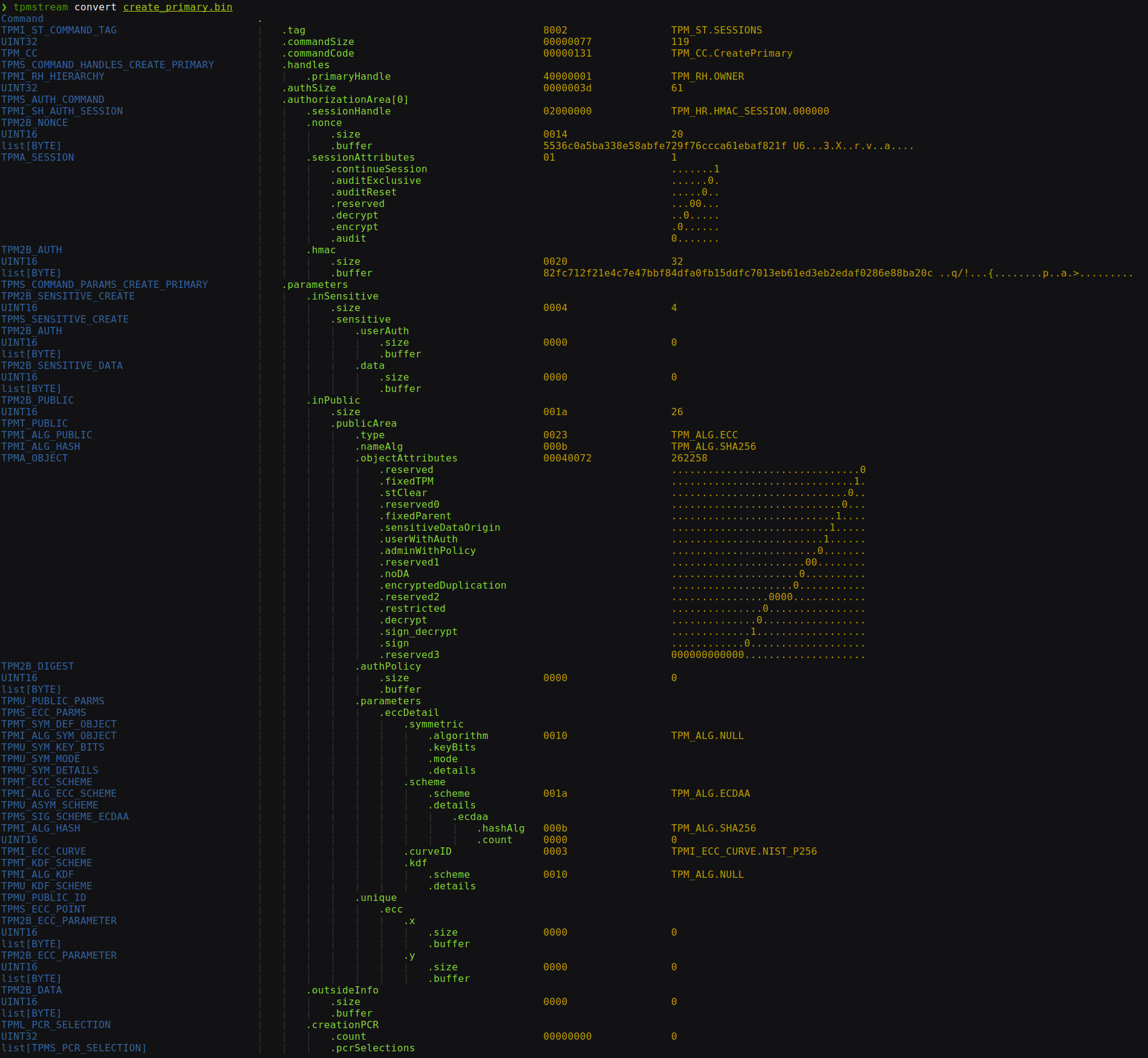A tool to help you understand TPM commands and responses. You can either use the
convert command if you want to decode TPM commands/responses or the example
command to find examples.
Try it online at joholl.github.io/tpmstream-web!
pip install .
For development, it is recommended to use a virtual environment and install with the --editable switch.
The convert command reads binary (or pcapng) data from a file:
❯ tpmstream convert create_primary.binOr you can read data from stdin. Just pass -:
❯ printf "80020000007700000131400000010000003d0200000000145536c0a5ba338e58abfe729f76ccca61ebaf821f01002082fc712f21e4c7e47bbf84dfa0fb15ddfc7013eb61ed3eb2edaf0286e88ba20c000400000000001a0023000b0004007200000010001a000b00000003001000000000000000000000" | xxd -r -p | tpmstream convert -You want to see an exemplary TPM command? Easy, try:
❯ tpmstream ex NV_WriteDon't worry, the tool helps you out if you do not know how to spell a given command:
❯ tpmstream ex NVDefine
Unknown commandCode: NVDefine.
Did you mean:
tpmstream ex NV_DefineSpaceMarshalling functions convert a particular data stream (binary, pcapng, ...)
into a canonical format: a sequence of MarshalEvents. These events can be
converted to a python representation of the respective datatype (e.g. a
TPMS_SIG_SCHEME_ECDSA object).
from tpmstream.common.object import events_to_obj
from tpmstream.io.binary import Binary
from tpmstream.spec.commands import Command
from tpmstream.spec.structures.constants import TPM_SU
events = Binary.marshal(tpm_type=Command, buffer=b"\x80\x01\x00\x00\x00\x0c\x00\x00\x01\x44\x00\x00")
command = events_to_obj(events)
print(command.parameters.startupType) # prints TPM_SU.CLEARLikewise, these python objects can be turned into a sequence of events, again.
from tpmstream.common.object import obj_to_events
from tpmstream.io.binary import Binary
from tpmstream.spec.commands import Command
from tpmstream.spec.commands.commands_handles import TPMS_COMMAND_HANDLES_STARTUP
from tpmstream.spec.commands.commands_params import TPMS_COMMAND_PARAMS_STARTUP
from tpmstream.spec.structures.base_types import UINT32
from tpmstream.spec.structures.constants import TPM_CC, TPM_ST, TPM_SU
from tpmstream.spec.structures.interface_types import TPMI_ST_COMMAND_TAG
startup_command = Command(
tag=TPMI_ST_COMMAND_TAG(TPM_ST.NO_SESSIONS),
commandSize=UINT32(12),
commandCode=TPM_CC.Startup,
handles=TPMS_COMMAND_HANDLES_STARTUP(),
parameters=TPMS_COMMAND_PARAMS_STARTUP(startupType=TPM_SU.CLEAR),
)
events = obj_to_events(startup_command)
# Note that `events` is a generator. You can obtain a list by via `list(events)`Unmarshalling functions convert a given set of MarshalEvents into a custom format (binary, pretty print, ...).
from tpmstream.io.binary import Binary
from tpmstream.io.pretty import Pretty
from tpmstream.spec.commands import Command
events = Binary.marshal(tpm_type=Command, buffer=b"\x80\x01\x00\x00\x00\x0c\x00\x00\x01\x44\x00\x00")
pretty = Pretty.unmarshal(events=events)
for line in pretty:
print(line)Marshalling (e.g. binary to events) and unmarshalling (e.g. events to pretty
print) is decoupled. Events can be turnt into python objects (like
TPMS_SIG_SCHEME_ECDSA) and vice versa.
+---------------------+ +----------------------+
---[binary]--> | binary marshalling | ---[events]---+-------------------------+---[events]--> | binary unmarshalling | ---[pretty print]-->
+---------------------+ | | +----------------------+
| +---------------+ |
+--> | python object | ---+
+---------------+

